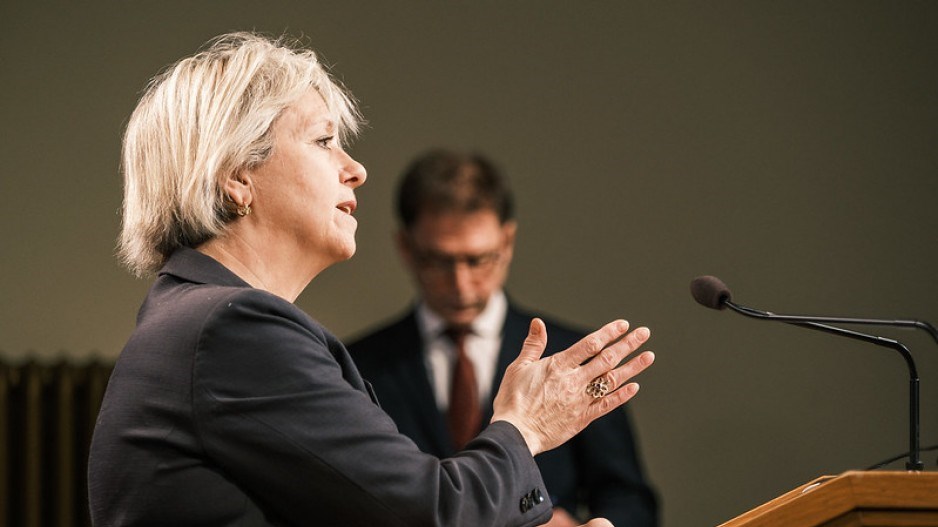B.C.'s battle against COVID-19 showed no signs of success on February 22, according to new data released by the province.
Health officials detected 1,428 new cases in the three days since the last update, including 449 infections identified in the past 24 hours, 475 new cases in the day before that, and 504 cases on February 20.
The number of those in hospitals fighting the virus rose by six to 223, while those in intensive care units of those hospitals rose by five to 66. There were eight additional deaths, for a total of 1,335 since the first fatality from the virus was documented last March.
The number of recoveries increased by 1,343 but was outpaced by the new cases, leaving 4,560 British Columbians now fighting active infections of the virus, up by 74 from three days ago.
The province also said that its testing revealed that 28 more of the 77,263 total confirmed COVID-19 infections are COVID-19 variants, which are believed to transmit more easily and may be more deadly. In total, the province has detected 101 cases of variants.
The number of variants identified in B.C. had been steadily rising. At the beginning of the month, there were 18 identified cases of variants in B.C. That rose to a total of 46 on February 12, and a total of 60 on February 16.
On February 19, the province said health officials had identified 73 cases of the variants: 52 cases of the B1.1.17 variant, which was first discovered in the U.K., 20 cases of the B.1.351 variant first discovered in South Africa, and one case of a variant first found in Nigeria.
It said February 22 that of all the current 101 variant cases, only four are active infections. That means that testing for the variants lags far behind testing for the virus itself, or the 28 newly identified infections would be in people who would not have had sufficient time to recover.
This rise in the number of identified variant cases has come at least partly because the province changed how it tested for the variants.
Deputy provincial health officer Réka Gustafson said February 22 that "about three weeks ago, we were able to go from testing about 20% of our samples for variants, to 70% of our samples for variants."
The province usually tests fewer than 10,000 people for COVID-19 during 24-hour periods, and sometimes fewer than 5,000 people. This is down from usually testing more than 10,000 people per day in early December.
B.C. also lags the rest of Canada when it comes to testing. In total, B.C. has provided 1,881,992 tests since January 2020, for a rate of 360,889 tests for each million residents. That is less than 58% of the Canadian average of providing 623,697 tests for each million residents, according to the province's COVID-19 dashboard.
Scrutinizing more tests for potential variants, Gustafson said, naturally leads to more cases of variants being found.
She defended the province's practice of not testing people who have no symptoms even if those people believe that they may be infected because they have had close contact with someone who has tested positive.
Gustafson said that those people should be self-isolating regardless of what any test might show, and that it could be dangerous to give those people tests that turn out to be negative, because those individuals may not complete their self-isolation period, and later be deemed to be positive.
She added that the determining factor in testing someone is "will the test – negative or positive – actually give you a useful piece of information, in order to actually change what you're doing, or change what what your doctor will be doing for you."
Here is the breakdown of where the 1,428 new cases are located:
• 358 in Vancouver Coastal Health (25.1%);
• 805 in Fraser Health (56.4%);
• 99 in Island Health (6.9%);
• 67 in Interior Health (4.7%); and
• 99 in Northern Health (6.9%).
About the only good news related to fighting COVID-19 in B.C. is that health officials administered an additional 25,784 doses of vaccine in the past three days, for a total of 218,726 shots to 167,669 people. Of those, a total of 55,057 have had two doses.
Two new healthcare facility outbreaks are at the Vancouver General Hospital and at Kelowna General Hospital, provincial health officer Bonnie Henry and Health Minister Adrian Dix said in a joint statement. One community outbreak has taken place at Grand River Foods in Abbotsford.
Outbreaks at Royal Inland Hospital in Kamloops, Abbotsford Regional Hospital, Eagle Ridge Manor in Port Moody, and Carrington Place Retirement Residence in Vernon are over, the two said.
That leaves 12 seniors' homes across the province that have active COVID-19 outbreaks – down from more than 50 during most of January.
The five active outbreaks at seniors' living facilities in Fraser Health are:
• CareLife Fleetwood in Surrey;
• Fleetwood Villa in Surrey;
• George Derby Centre in Burnaby;
• Royal City Manor in New Westminster; and
• Shaughnessy Care Centre in Port Coquitlam.
Two outbreaks at seniors' homes in Nanaimo – Eden Gardens and Wexford Creek – are the only ones in the Island Health region.
The outbreak at the Acropolis Manor in Prince Rupert is the only active outbreak in Northern Health.
The four active outbreaks at seniors' living facilities in Interior Health are at:
• Brocklehurst Gemstone Care Centre in Kamloops;
• Creekside Landing in Vernon;
• Noric House in Vernon; and
• The Florentine in Merritt.
The list of B.C. hospitals with active COVID-19 outbreaks includes:
• Burnaby General Hospital in Burnaby;
• Dawson Creek and District Hospital in Dawson Creek;
• Kelowna General Hospital in Kelowna;
• Mission Memorial Hospital in MIssion;
• St. Paul's Hospital in Vancouver; and
• Vancouver General Hospital.



